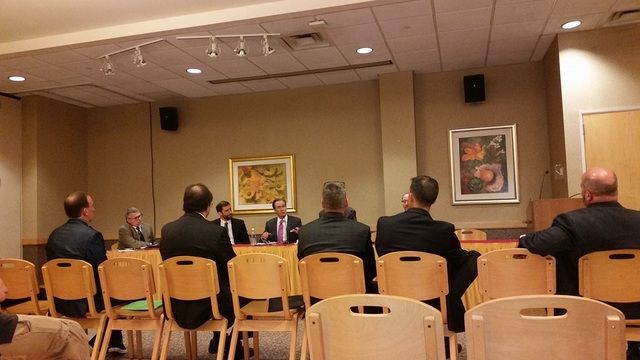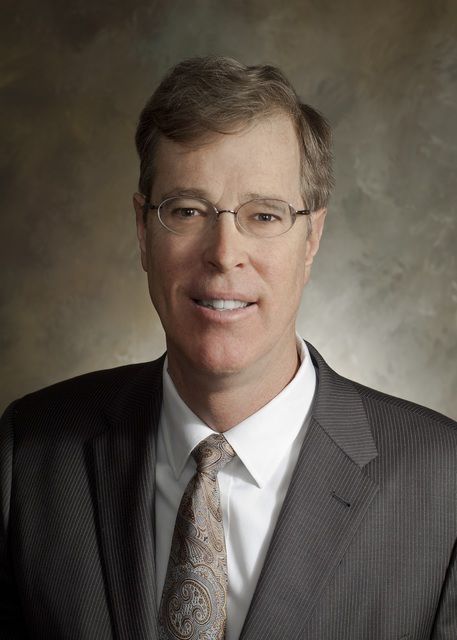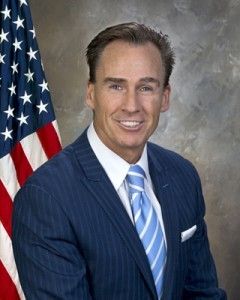Click here to subscribe today or Login.
WILKES-BARRE — Perry Meadows’ family knows the pain of drug addiction all too well.
The medical director of government programs for Geisinger Health Plan testified at a state hearing Wednesday about the importance of physicians assuming responsibility in preventing addiction by appropriately and cautiously prescribing drugs.
But it was Meadows’ emotional testimony about his family’s experience with addiction that had attendees putting down their pens and notebooks to listen carefully.
Meadows recounted the journey of his stepson into addiction following an injury.
He told of resuscitating the young man in a hallway of his home, an experience he said negatively affected his younger son.
“I’m telling you that I will never be debt-free, as I spent thousands of dollars trying to find the right program, trying to change his lifestyle, trying to keep him alive,” he said. “I understand what it’s like to see an incoming phone call from an unknown area code and you think ‘this is it.’”
It was that personal experience that underscored the very purpose of the meeting — to examine laws and policies to better make drug and alcohol services available to those in addiction.
Meadows’ testimony came at a hearing held by the Pennsylvania Department of Drug and Alcohol Programs at King’s College Campus Center.
Identifying himself as both a doctor and an insurer, he testified before Lt. Gov. Mike Stack and Secretary of the Pennsylvania Department of Drug and Alcohol Programs Gary Tennis.
Meadows offered testimony regarding the importance of insurance companies fully funding necessary services such as art therapy, guided imagery and acupuncture as part of an interdisciplinary program.
Tennis asked Meadows what he sees as the major barriers to recovery.
“Access to treatment,” Meadows said. “And other issues as simple as provision of transportation.”
Many of those testifying expressed concern not only about access to treatment, but about its length and quality.
Michael Donahue, director of Luzerne County’s Human Services Division, expressed concern about federal Medicaid regulations that would limit treatment, including both detox and rehabilitation, to 15 days.
Donahue said that is not enough.
“After 15 days, addicts will use again,” he said. “They’ll go back to using the same amount as they did when they entered treatment, and they’ll die.”
Tennis said because the language reads “15 days per month,” those entering a drug treatment center on the 16th of the month would be able to stay for 30 days.
“That’s not an appropriate approach to treatment,” Tennis said, “to try to get a client in on the 16th of a month so he or she could stay longer and have a better opportunity for success.”
He referred to 29 state senators protesting the proposal and urging its repeal.
“This is an illegal and deadly proposal,” he said. “It violates the Mental Health Parity and Addiction Equity Act, which mandates care for substance abuse disorders be treated in the same manner as care for other physical diseases.”
Robert Norris, CEO of the Pocono Mount Recovery Center, shared the challenges of providing drug rehabilitation services within the context of insurances.
“In the month of August alone, there were 23 individuals unable to admit to our facilities due to high out-of-pocket costs,” he said. “These were 23 people with benefits covering our facilities and clinically appropriate, however, they could not access treatment because of high deductibles and co-pays.
Norris said his management team had instituted a financial hardship and free service programs to bridge the gap between finances and treatment.
“In the month of August, the cost to the company for these programs was $121,986,” he said.
Still, he said, many of those willing to come into treatment could not do so because of financial hardship.
Donahue, himself in recovery, recounted time spent in treatment over 30 years ago.
“I was there for 90 days at a cost of $1,800,” he said. “Since then, I’ve built a life; I’ve helped others and I’ve paid taxes. I think it was worth it.”







